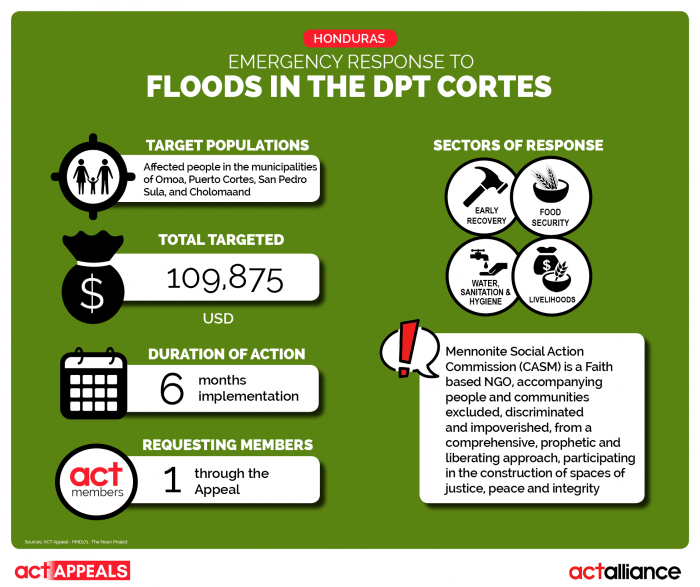Background On 23 October 2017, the Permanent Contingency Commission (COPECO) declared an alert in five of the country’s departments: Cortés, Yoro, Atlántida, Islas de La Bahía and Colón; the alert was declared in response to the arrival of the first cold front of the season, which brought heavy rains and prompted COPECO to raise the alert level for the departments of Islas de la Bahía, Cortés, Atlántida and Colón at 5:00 pm on 24 October. That same day, the government declared a state of emergency due to the presence of the weather system in the departments of Cortés, Atlántida, Yoro, Colón, Islas de la Bahía and Gracias a Dios. The weather system brought heavy rainfall, which caused rivers and gorges to flood. As of 29 October 2017, a red alert was in effect for the departments Gracias a Dios, Yoro, Islas de la Bahía, Cortés, Atlántida and Colón, while a yellow alert was in place for departments Olancho, Santa Bárbara and Francisco Morazán and a green alert for the departments of Copán, Comayagua, La Paz, Valle, Choluteca, Lempira, Ocotepeque, Intibucá and El Paraíso.
According to official data provided by COPECO, the flooding has had the following impact on Honduras:
• 10,564 affected households
• 50,770 affected persons
• 4876 evacuated households (24,691 persons)
• 25 persons rescued
• 1799 households in temporary shelters (9351 persons)
• 5012 damaged houses
• 13 totally destroyed houses.
Additionally, Tropical Depression Selma formed in the Pacific at the same time as a tropical disturbance in the Atlantic according to COPECO’s National Centre of Atmospheric, Oceanographic and Seismic Studies, producing moderate to strong rains, especially in the country’s south central and western parts.
According to data collected by COPECO in the affected communities, the floods has critically damaged main livelihoods and food stocks. The floods have affected the crops, forcing many of the affected families to change their diets and implement survival strategies; for example, affected farmers have begun selling their agricultural products at a very low cost, which will affect their income generation. Water distribution systems are affected and water is not safe for drinking. Lastly, due to deterioration of residual water and excreta management systems, the affected population is at risk to water and vector-borne diseases and other dangers to their health. There is urgent need of food, water and sanitation support and livelihood restoration.
The ACT Honduras Forum through its local member Mennonite Social Action Commission (CASM) by it´ Spanish acronym, is responding to this crisis by providing Food security, WASH and livelihood recovery to 1463 households. The target for this appeal is $109,875.04 USD to provide humanitarian relief.

